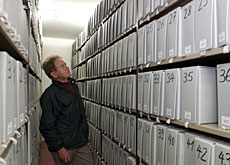Transparency rules with limited impact

Citizens are set to have easier access to official documents of the Swiss federal administration as of July – a move intended to boost trust in public institutions.
The new rules are not likely to have a major impact in the short term, but the data protection commissioner has complained about the extra workload for his office.
The justice ministry says the Swiss law on public access to official information is neither very liberal nor is it particularly restrictive in comparison with regulations in other European countries.
“The new law is intended to create a more transparent administration, improve public access to information and boost cooperation between the federal offices,” said Simone Füzesséry of the justice ministry.
In what is considered a fundamental policy change, official documents will no longer remain locked away within the administration. They can be made public in principle if a citizen demands the information.
Access may be limited, delayed or even refused if there is a possible risk to national security or if it adversely affects the ability of, for instance, the cabinet or a parliamentary committee, to take decisions.
The legislation also applies to some extent to public services such as the Swiss Post Office and the Federal Railways, but the Swiss National Bank and the Federal Banking Commission are exempt for example.
During the debate in parliament critics had argued that there are too many loopholes that allow for exceptions from the principle of transparency.
Watered down
Beat Leuthardt, a legal expert and author, remains sceptical about the efficiency of the regulations which come after more than two decades of discussions.
“It’s a watered-down version of the initial bill and the authorities dragged their feet to introduce the measure,” he told swissinfo.
Leuthardt believes that the legislation is no guarantee for more transparency.
“In the best case an official willing to hand out information will have legal backing and citizens who insist stand a better chance of getting access to a document.”
Leuthardt also points out that the principle of data protection was not taken seriously enough.
“The Data Protection Commissioner was given more work, but he was denied more powers or personnel.”
His criticism is echoed by the Federal Data Protection Commissioner, Hanspeter Thür, who will have to mediate in controversial cases where the administration wants to limit access.
He said his office wouldn’t be to cope with the extra workload because the government refused to hire more employees for the moment.
Limited impact
Neither the legal nor the media profession believes that the law will have a big impact on their everyday work.
“We welcome the amendments in principle. The law is a way of tightening controls on the administration,” said Michael Hüppi, a leading member of the Association of Swiss Barristers.
Legal experts have already had access to all the necessary documents in a court case according to Hüppi. He adds that citizens stand to benefit because they can more easily access information on tax matters or records on road offences.
“I think the law will help improve relations between citizens and public institutions.”
Referring to a similar law introduced on a cantonal level, Martin Künzi of the Swiss Press Council expects no immediate changes.
“But it could change the attitude of the administration towards the media in the mid-term,” he admitted.
Hans Stutz, editor in chief of the media magazine, Klartext, takes a pragmatic approach.
“It’s now up to the journalists and publishers to fight for extended access to documents by taking cases to the court,” he told swissinfo.
He doubts whether investigative journalism would be given a boost.
“Journalists who do extensive research are not much in demand in Switzerland anymore. Many publishing houses have cut back their budgets and can’t afford expensive scoops.”
swissinfo, Urs Geiser
Parliament approved the new law in December 2004, which comes into force at the beginning of July 2006.
The EU has had transparency measures in place for the council, commission and parliament since 2001.
Many countries, notably France, Britain and Germany, as well as the US, Canada, Australia, New Zealand and South Africa have introduced similar rules for their administrations.
Sweden was pioneering transparency in the administration more than 200 years ago.

In compliance with the JTI standards
More: SWI swissinfo.ch certified by the Journalism Trust Initiative


You can find an overview of ongoing debates with our journalists here. Please join us!
If you want to start a conversation about a topic raised in this article or want to report factual errors, email us at english@swissinfo.ch.